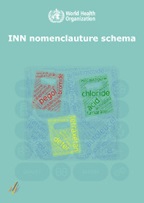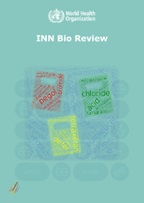INN for biological and biotechnological substances
In 1982, the name insulin human was proposed for the recombinant protein identical to natural human insulin, and since then names have been assigned to a growing number of recombinant products. Within the INN Programme, names have not been assigned to natural human blood products or vaccines. For those groups of biological products, the WHO Expert Committee on Biological Standardization (ECBS) has been adopting the scientific names of the biological products within the definitions of respective requirements.
Since the time when insulin human became the first recommended INN (rINN) for a recombinant product, the range of biological / biotechnological products has increased in size and complexity. For example, new stems have been introduced for tissue plasminogen activators (-plase) among other groups. Analogues of recombinant glycosylated proteins produced in different cell systems have been classified using Greek letters as indicators in the sequence of product introduction: erythropoietin ( epoetin alfa, beta and so on) and glycoprotein hormones (follitropin) are examples. In the 1990s, a systematic scheme for naming monoclonal antibodies was implemented, based on the stem -mab, which indicates the origin (mouse, human, etc) of the antibody and its intended use: tumour, immunomodulator and so on.
The following document, first published on the website of the INN Programme in 2006, therefore presents an inventory of the policy decisions taken by the INN Expert Group during all these years of change, and of the names assigned to biological and biotechnological substances. Considering the potential for further developments in the field of biologicals, this review is intended to be a living document which will be regularly updated to include new policies, and future INNs assigned.

INN for Cell-based therapies
Mandatory information for INN selection and publication for cell-based therapies including cell-based gene therapy substances.(Please note that incomplete...

INN for Variant COVID-19 Vaccine Active Substances
Any change to the structure of a medicinal active substance will trigger a requirement for a new INN to be assigned. To highlight the close...

-tug for “unmodified immunoglobulins”The suffix -tug is used for monospecific full-length immunoglobulins with unmodified constant...

INN for Nucleic acid-based substances
Mandatory information for INN selection and publication for nucleic-acid based substances including gene therapy substancesAnnex to INN application form(Please...

INN for Proteins (including monoclonal antibodies)
Mandatory information for INN selection and publication for all proteins (including monoclonal antibodies):Annex to INN application form(Please note that...

INN for fusion protein
The -fusp naming scheme is not designed to give comprehensive information about the substance in the name, but rather to indicate that it is a fusion protein...

INN Bio Review 2022
This document, first published on the website of the INN Programme in 2006, therefore presents an inventory of the policy decisions taken by the INN Expert...
